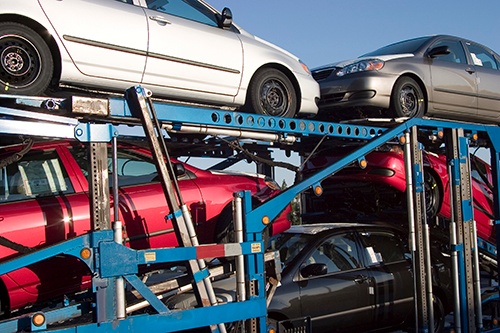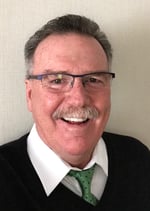
Hansen & Adkins Vice President of Operations Barry Williams began work in the automotive haul-away industry in 1984. He started as a quality claims supervisor and filled various positions in the company as he advanced, including director of safety and risk management, ISO 9000 manager, and driver trainer. In his current role, he grew the company from 33 trucks to its current 1,340 trucks. Williams also co-founded and leads the Auto Haulers Association of America in 2011 with Bill Fralic, which works to achieve higher pay for auto haul truck drivers to better attract the workforce to the industry.
In this interview, Williams shares observations on the current state of the finished vehicle logistics industry and reflected on what volunteering at AIAG has done for him and his company.
Q: What have been the highlights of your career?
 Williams: I’ve been in the industry for 37 years, and it’s been the best ride and all I could have asked for. It’s been a career I couldn’t have replaced anywhere else. Developing relationships have been the best part. I’m having too much fun to retire.
Williams: I’ve been in the industry for 37 years, and it’s been the best ride and all I could have asked for. It’s been a career I couldn’t have replaced anywhere else. Developing relationships have been the best part. I’m having too much fun to retire.
Q: How did you get involved with AIAG?
Williams: I started volunteering about five years ago when I was asked to serve on the AIAG FVL Advisory Group. I knew several of the people on the committee at that time, and they were all people I respected. It was a real honor, and I was excited to participate.
Q: What would you like to see the FVL Advisory Group focus on over the next year?
Williams: We’ve got to find ways to minimize driver time in the yard. The driver is the highest paid person in FVL, and there is a great demand for drivers in other industries. We have to make their work experience as efficient and hassle-free as possible. Either that, or someone is going to lure our drivers away from us to work for them instead. If you want drivers to come to your yard, you have to make your yard the best place to work.
Q: What changes would you make to the strategic direction of the FVL industry?
Williams: We need to create a better salary stream for car haul drivers and set some basic wage or salary levels for industry drivers. I’d like to see the industry standardize IT solutions and IT communications and set up a standard for acceptable pass-through on minor defects in quality.
AIAG can help the FVL industry with more standardization in apps, processes, and procedures. We need to get the processors, ports, plants and rail to go paperless and match up the ELD, GPS, and paperless processes.
Q: What is the biggest challenge facing FVL?
Williams: We are going to have a real problem when auto production goes back up. During COVID, carriers suffered a 11-14 percent loss of drivers. Things are starting to pick back up, but we haven’t been able to recover those drivers. The pandemic was devastating to the driver workforce. Since 2019, we’re down 28 percent in drivers. The auto manufacturers are going to be back to full production one day soon, and those new vehicles are going to pile up at the ports, railheads, and yards.
It’s going to cost someone to get these drivers back into the game. Drivers are making $95,000 to $120,000 a year now from companies like Amazon and FedEx, and their conditions aren’t as strenuous as automotive’s are. Drivers want more time at home with their families. We have to figure that out.
Q: What concerns you most as you look at the coming year?
Williams: The driver shortage is going to affect everyone. And if we don’t fix it, it’s going to drive more consumers to buy vehicles online and have their cars delivered to their home. We’ve got to put the workforce back into this industry.
Q: How would you address the driver shortage?
Williams: We could lower the age to qualify and could set up recruiting streams from the military.
Q: Why do you volunteer at AIAG?
Williams: AIAG is independent and not biased. That’s why AIAG is the best place to establish criteria for processes, operating systems, standards, and SOPs. AIAG sits in the middle. It’s the place to develop the important things that need to be done.
Q: What do you say to members who are not volunteering at AIAG?
Williams: If you’re going to pay the membership dues, you need to put your people in and get involved. If you don’t get involved, you have no takeaways. You’re going to create takeaways from your involvement.
It’s about developing relationships with different kinds of people. It’s not about staying in the know. It’s about your relationships. That’s how you contribute and put your ideas on the table. This is very important. Those relationships are what you need to move forward. I’m all about moving forward.


